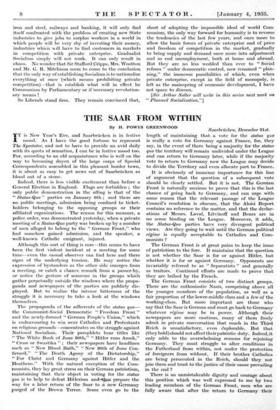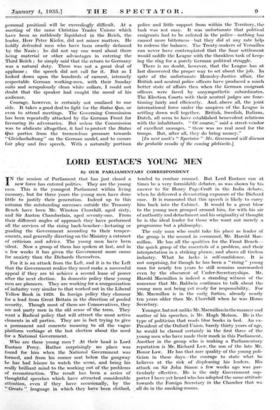THE SAAR FROM WITHIN
By H. POWYS GREENWOOD
Saarbriicken, December 31st.
IT is New Year's Eve, and Saarbriicken is in festive mood. As I have the good fortune to represent The Spfdator, and not to have to provide an avid daily with its quota of sensation, I can be in festive mood too. For, according to an old acquaintance who is well on the way to becoming doyen of the large corps of Special Correspondents assembled in this pleasant border town, it is about as easy to get news out of Saarbrficken as blood out of a stone.
Indeed, there is less visible excitement than before a General Election in England. Flags are forbidden ; the only public demonstration in the offing is that of the " Status-Quo" parties on January 6th ; and there are no public meetings, admission being confined to ticket- holders belonging to the opposing groups or their affiliated organizations. The reason for this measure, a police order, was demonstrated yesterday, when a private meeting of a Status-Quo party was broken up by a number of men alleged to belong to the " German Front," who had somehow gained admission, and the speaker, a well-known Catholic emigrant, injured.
Although this sort of thing is rare—this seems to have been the first violent incident at a meeting for some time—even the casual observer can find here and there signs of the underlying tension. He may notice the expression of bystanders as the other side emerges from a meeting, or catch a chance remark from a passer-by, or notice the gesture of someone in the groups which gather perpetually outside the windows where the propa- ganda and newspapers of the parties are publicly dis- played. But to realize the intense bitterness of the struggle it is necessary to take a look at the windows themselves.
The propaganda of the adherents of the status quo— the Communist-Social Democratic " Freedom Front " and the newly-formed " German People's Union," which is endeavouring to win over Catholics and Protestants on religious grounds—concentrates on the struggle against National Socialism. Their pamphlets bear titles like " The White Book of June 80th," " Hitler runs Amok," " Cross or Swastika " ; their newspapers have headlines such as " New Blood Bath," " New 80th of June Con- firmed," " The Death Agony of the Dictatorship," " For Christ and Germany against Hitler and the 'Heathens." With the natural exception of the Corn- , munists, they lay great stress on their German patriotism, maintaining that their object in voting for the status quo is to help to defeat Hitlerism and-attuis prepare the way for a later return of the Saar to a new Germany purged of the Brown Terror. Some even go to the length of maintaining that. a vote for the status quo is really a vote for. Germany against France, for, they say, in the event of there being 'a majority for the status quo the territory will remain undivided under the League and can return to Germany later, while if the majority vote to return to Germany now the League may decide to divide the Territory and even allocate part to France.
It is obviously of immense importance for this line of argument that the question of a subsequent , vote should be clearly settled. But it is not. The German Front is naturally anxious to prove that this is the last chance of going back to Germany, and can urge with some reason that the relevant passage of the League Council's resolution is obscure, that the Aloisi Report contains no reference to the matter, and that the declar- ations of Messrs. Laval, Litvinoff and Benes are in no sense binding on the League. Moreover, it adds, the Status-Quo parties have very divergent political views. Are they going to wait until the German political regime is equally acceptable to Catholics and Com- munists ?
The German Front is at great pains to keep the issue of patriotism to the fore. It maintains that the question is not whether the Saar is for or against Hitler, but whether it is for or against Germany. Opponents are invariably referred to as " Separatists " and generally as traitors. Continued efforts are made to prove that they are bribed by the French.
The German Front consists of two distinct groups. There are the enthusiastic Nazis, comprising above all the younger members of the population, as well, as a fair proportion of the lower-middle class and a few of the working-class. But more important are those who say that the Saar is German and must go back to Germany whatever regime may be in power. Although their newspapers are more cautious, many of them freely admit in private conversation that much in the Third Reich is unsatisfactOry, even deplorable. But that (they hold) should not affect their patriotic duty. Indeed, it only adds to the overwhelming reasons for rejoining Germany. They must struggle to alter conditions in the Fatherland from within, not under the protection of foreigners from without. If their brother Catholics are being persecuted in the Reich, should they not join them and trust to the justice of their cause prevailing in the end ?
There is an unmistakeable dignity and courage about this position which was well expressed to me by two leading members of the German Front, men who are fully aware that after the return to Germany their Tersonal position will be exceedingly difficult. At a meeting of the same Christian Trades Unions which have been , so. ruthlessly liquidated in the Reich, the leader, Herr Peter Kiefer, did not mince matters. He boldly defended men who have been cruelly defamed by the Nazis ; he did not say one word about there being material or other advantages in entering the Third Reich ; he simply said that the return to Germany was a natural duty. There was not a great deal of .applause ; the speech did not call for it. But as I looked down upon the hundreds of earnest, intensely respectable German working-men, with their Sunday suits and scrupulously clean white collars, I could not doubt that the speaker had caught the mood of his audience.
Courage, however, is certainly not confined to one side. It takes a good deal to fight for the Status Quo, or even to attend meetings. The Governing Commission has been repeatedly attacked by the German Front for favouring its adversaries. But unless the Commission was to abdicate altogether, it had to protect the Status Quo parties from the tremendous pressure towards "Gleichschaltung " on the German model, and to ensure fair play and free speech. With a naturally partisan police and little support from within the Territory, the task was not easy. It was unfortunate that political emigrants had to be enlisted in the police—nothing .has caused more bitterness—but they did at any rate help to redress the balance. The Treaty-makers of Versailles can never have contemplated that the Saar settlement would saddle the League with the thankless task of keep- ing the ring for a purely German political struggle.
There is no doubt, however, that the League , has at last discovered the proper way to set about the job. In spite of the unfortunate Hemsley-Justice affair, the British and neutral police officers have produced a much better state of affairs then when the German .emigrant officers were faced by unsympathetic subordinates. The Election Courts with their neutral judges are func- tioning fairly and efficiently. And, above all, the joint international force under the auspices of the League is settling down well together. British, Swedish, Italians, Dutch, all seem to have established benevolent relations with the inhabitants. " Of course," said a street-vendor of excellent sausages, " there was no real need for the troops. But, after all, they do bring money."
[In next week's " Spectator " Mr. Greenwood will discuss the probable results of the coming plebiscite.]







































 Previous page
Previous page